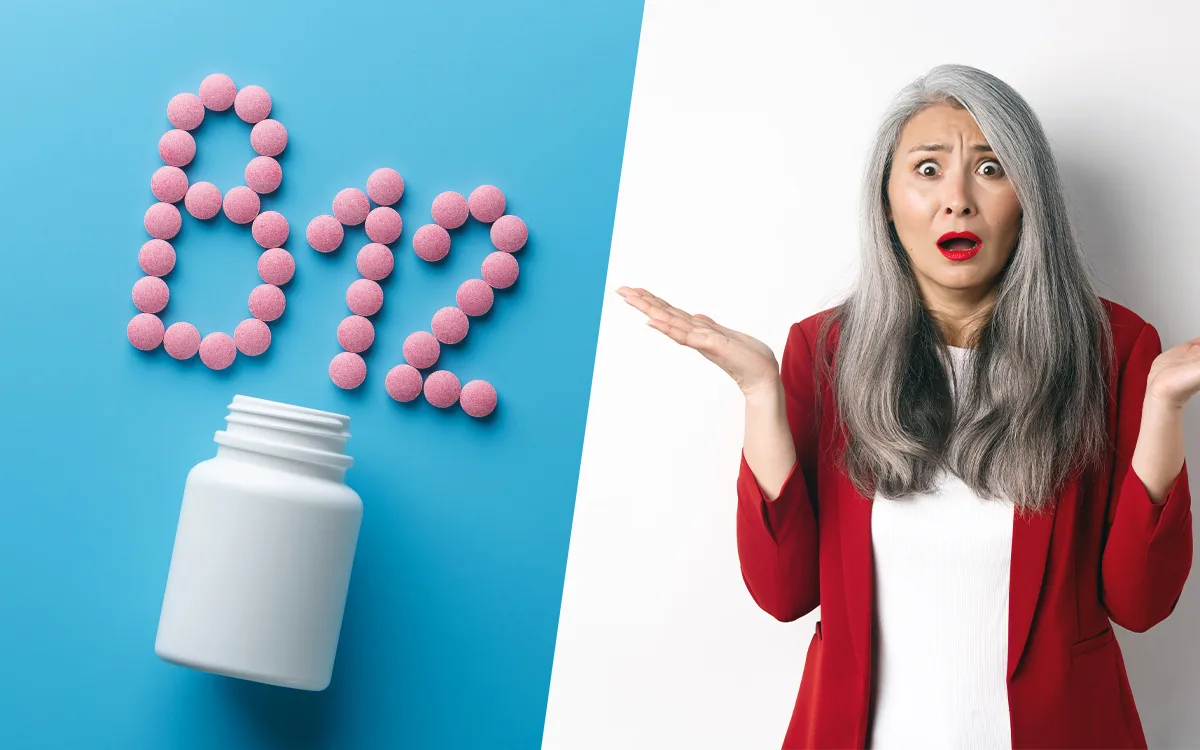Gray hair is a natural part of aging, but many people start noticing silver strands earlier than expected. While genetics play a big role, nutritional choices and overall health can also affect hair pigmentation. This has raised a common question: can vitamins actually help restore natural hair color? Let us look at how nutrition, melanin-producing cells, and certain vitamins may play a part in gray hair.
What causes gray hair?
Hair color comes from melanin, the pigment made by specialized cells in the hair follicles. As we age, these melanin-producing cells become less active, and the production of melanin pigment slows down. When there is not enough melanin, hair grows out gray or white.
Another factor is oxidative stress in the hair follicles. Over time, hydrogen peroxide can build up naturally in the hair shafts. This chemical can interfere with melanin production, causing the strands to lose color. Both genetics and lifestyle factors, such as diet and stress, can influence when this process begins.
What vitamins are linked to gray hair?
Certain vitamins and minerals are essential for hair growth, pigmentation, and overall hair health. A vitamin deficiency may sometimes show up as premature hair graying, thinning, or even hair loss. Some key nutrients include:
- Vitamin B12: One of the most studied nutrients for hair color. Low levels of vitamin B12 are linked to premature hair graying. This vitamin helps maintain healthy supply of oxygen to hair follicles and support melanin production.
- Folate (Vitamin B9): Works closely with vitamin B12 in DNA repair and cell renewal. A lack of folate can affect melanin-producing cells, possibly leading to loss of pigmentation.
- Vitamin D: Important for overall hair follicle health and the life cycle of hair.
- Minerals like copper and iron: Copper plays a role in melanin pigment formation, while iron deficiency is commonly linked with hair issues.
Although these vitamins and minerals may not directly reverse gray hair, they help maintain conditions that support natural hair pigmentation.
How does nutrition affect hair color?
Hair is made mostly of protein, and it needs a steady supply of vitamins and minerals to grow and maintain its natural color. A nutrient-rich diet that supports hair pigmentation includes foods like leafy greens, nuts, seeds, eggs, dairy, beans, and fish.
When the body lacks essential nutrients, melanin production may slow down, and hair follicles may not function at their best. Over time, nutritional deficiencies can contribute to premature hair graying. Eating a balanced diet helps maintain the health of hair follicles and keeps melanin production active for as long as possible.
Can vitamins restore natural color to gray hair?
This is the most asked question, and the answer is not simple. Once hair has turned gray due to natural aging, vitamins alone cannot fully restore its original color. Gray hair happens because the hair follicle has lost its ability to produce melanin pigment.
However, in cases where gray hair is linked to vitamin deficiency or poor nutrition, correcting the deficiency may help restore color in some strands. For example, if premature hair graying is caused by low vitamin B12, proper supplementation may allow hair to regain pigment as new strands grow.
It is important to note that results vary from person to person. For many people, hair dyes remain the most effective way to restore visible color. Still, nourishing the body with vitamins and minerals supports healthier hair growth and may slow further graying.
How to support hair pigmentation naturally?
While there is no magic pill to reverse gray hair completely, certain steps may help maintain your natural shade longer:
- Eat a nutrient-rich diet: Include foods rich in B vitamins, iron, copper, and protein.
- Check for vitamin deficiency: Sometimes hair graying or hair loss can be an early sign of nutritional imbalance.
- Support melanin production: Foods like lentils, leafy greens, eggs, and fish contain nutrients that help melanin-producing cells.
- Minimize oxidative stress: A lifestyle with proper sleep, stress management, and healthy eating habits helps ease damage that may affect hair follicles.
- Consider supplements when needed: If diet alone is not enough, supplements with vitamin B12, folate, and other essential nutrients can support overall hair health.
Conclusion
Gray hair is a natural part of life, mainly influenced by genetics and aging. But nutrition also plays an important role in hair pigmentation. While vitamins cannot fully reverse gray hair caused by aging, they may restore color in cases linked to deficiencies and help maintain healthier hair growth cycle. A diet rich in essential vitamins and minerals supports melanin production and overall hair health.
If you are noticing premature hair graying, checking your vitamin levels, especially vitamin B12, may be worthwhile. Even though hair dyes remain the most reliable way to restore hair color, nourishing your body from within gives your hair the best chance to stay strong and vibrant for longer.
Check out this blog: Understanding Hair Porosity: How It Affects Your Hair Health

